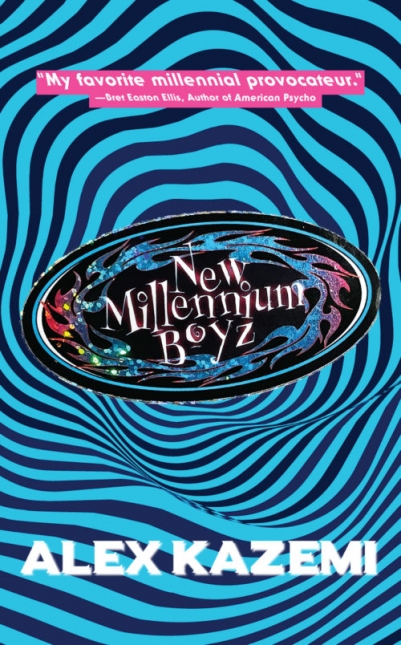New Millennium Boyz
- By Alex Kazemi
- Permuted Press
- 400 pp.
- Reviewed by Michael Maiello
- September 15, 2023
How the modern Modern Era mauled the American male.

Quirks of the Gregorian calendar aside, from the vantage of 2023, the world entered an interregnum in 1999 as old-media culture peaked and began to give way to our ubiquitously networked present. But those old-media forces exerted a powerful rearward inertia, warping young minds through the marketing of desires too weird and contradictory to be understood, much less fulfilled. New Millennium Boyz, the raucous, raunchy, and captivating debut novel by Alex Kazemi, takes us back to that moment of cultural peril from a decidedly masculine (and pornographic, nihilistic, and offensive) point of view.
In this coming-of-age tale (with an emphasis on coming), Brad Sela enters his senior year of high school having shed his virginity at summer camp. When he returns to school, he meets Shane and Lus, a pair of transfers who are fascinating outsiders. Kazemi beautifully captures that psychological phase in high school where people leave childhood friends for new ones — in this case, just as they all prepare to graduate and contemplate putting the entire school experience behind them.
Lus is a charismatic, Marilyn Manson-loving Satanist with fetishes for hexes, psychological torment, and physical violence. Shane is a depressed homosexual. Brad, the golden boy, follows them from the vanilla world of Blink-182 into an underground scene of raves, drugs, and Handycam exhibitionism.
Brad’s parents are oblivious. Mom takes all her cues from Oprah and wants her son to adopt the “power of positive thinking” vibe that the talk-show host sold to America’s daytime-television viewers throughout the 1990s. Dad just wants to be pals with Brad and is glad he didn’t have a daughter so he doesn’t have to read Reviving Ophelia (the once-ubiquitous 1994 nonfiction bestseller about the struggles of teenage girls). In the tradition of white 90s parents, they’ve chosen safety by raising Brad in a well-funded suburb, limiting his movements by refusing him a car, and keeping the computer out of his bedroom to prevent him from becoming a “screenager.”
Kazemi’s look back at the turn-of-the-21st-century culture of young American males resists nostalgia. Characters are described by their clothing (band T-shirts, slogans, and fashion labels) with dizzying density to remind the reader that, yes, kids used to wear labels like “Porn Star” which were emblazoned with the ironic message, “Must Be 18.” We also sold teen boys on the ideal of sex with models like Jenny McCarthy and Carmen Electra while presenting virginity as a sort of disability — all while tempting them with party drugs and other pharmaceuticals and stuffing their bellies with ultra-processed foods marketed to promote “extreme” lifestyles.
The outcast mass murderers from Columbine High School loom large in the lives of Brad, Shane, and Lus, as does Matthew Shephard, tortured and murdered in Wyoming in 1998 for being gay. Against this backdrop, Lus wants to burn it all down, corrupting a seemingly perfect kid like Brad as part of his plan. Shane is a sullen follower. And Brad, for his part, is too naive and self-absorbed to save himself.
But Brad does struggle, and most of the tension in the story comes from the strain between what he does (and documents on camera) with Lus and Shane and what he tells his parents and his camp girlfriend, Aurora, about what his life is like.
Left to themselves, the boys develop a toxic relationship with the phony world around them, one older than the world depicted in The Catcher in the Rye and as universal as the one portrayed in Hamlet. Like Holden Caulfield’s before him, Brad’s understandable inner rage propels him toward oblivion. In a typical exchange among the three friends, they discuss pop singer Fiona Apple, who’d spoken out as a sexual-abuse victim and about the music industry’s exploitation of talent. Says Brad:
“Exploited? All girls are victims who want attention. It must be so hard crawling around MTV in your underwear. It’s not like every teenager in this country doesn’t want that opportunity.”
Shane tries to defend Apple based on the quality of her music, but Lus ultimately sides with Brad, quipping: “If your whole personality is defined by the fact that you got raped when you were twelve, then you’re very boring.”
Kazemi endorses none of it, but conversations like this (which is relatively tame compared to a lot of what New Millennium Boyz serves up) remind us that, as a society, we once told young men that they should be simultaneously rebellious, powerful, attention-seeking, high-achieving, and good. But that fifth element collapses under the previous four, especially in a culture that models everything but how to be good.
The first quarter of the 21st century sees Brad and his peers grow up, some into power and some not, and several into an anger that manifests in toxic politics and rioting in the streets. Many of these boys are now broken men doing their best to likewise break the world. New Millennium Boyz comes too late to be a cautionary tale, but it surely explains a lot.
Michael Maiello is an author, journalist, and playwright. He worked for 10 years as a writer and editor at Forbes, and his work has appeared in McSweeney’s, the New Yorker, the New York Times, and other publications.

